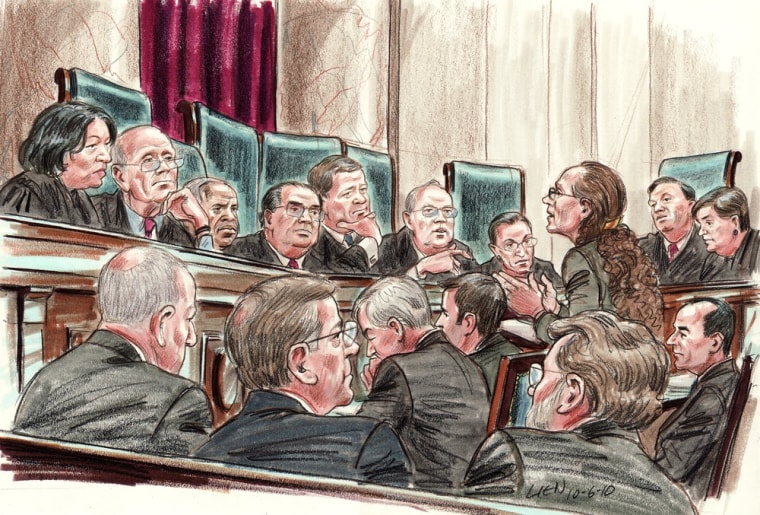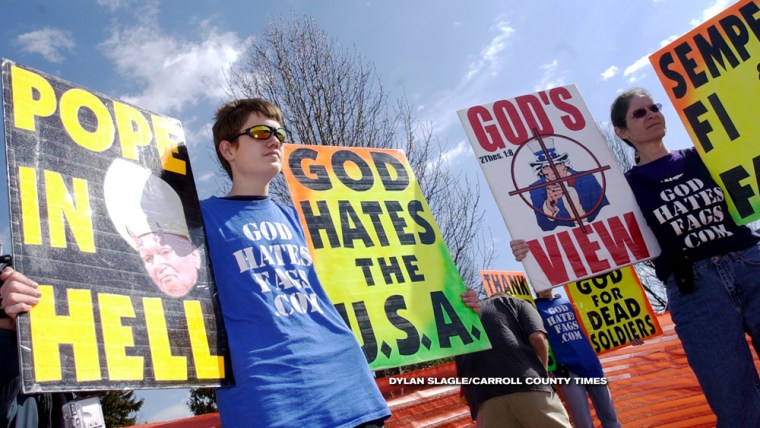The top U.S. court, in a sensitive test of free-speech protections, considered on whether a fundamentalist church had the right to picket at a Marine's funeral with signs like "Thank God for Dead Soldiers."
The father of a Marine killed in Iraq is asking the Supreme Court to reinstate a $5 million civil verdict against members of the Westboro Baptist Church of Topeka, Kansas. An appeals court threw out the fine on the ground that the First Amendment to the U.S. Constitution guarantees the right of free speech.
The Supreme Court justices heard arguments Wednesday in the emotion-laden case of Albert Snyder. His son died in Iraq in 2006, and members of the Westboro Baptist Church protested the funeral to make their point that U.S. deaths in Afghanistan and Iraq are punishment for Americans' immorality, including tolerance of homosexuality and abortion.
Justice Ruth Bader Ginsburg said the question is whether the First Amendment must tolerate "exploiting this bereaved family."
There was no clear answer from the court during the questioning.
Snyder is asking the court to reinstate the lower-court verdict's fine against the Westboro members who held signs outside the funeral of Lance Cpl. Matthew Snyder, including ones that read "Thank God for Dead Soldiers, "You're Going to Hell" and "God Hates the USA." The Marine was killed in a Humvee accident in 2006.
The church also posted a poem on its website that attacked Snyder and his ex-wife for the way they brought up Matthew.
Westboro members, led by the Rev. Fred Phelps, have picketed many military funerals to make their point that U.S. deaths in Afghanistan and Iraq are punishment for Americans' immorality, including tolerance of homosexuality and abortion.
The case pits the right of the father, Albert Snyder, to grieve privately against the church members' right to say what they want, no matter how offensive.
The members of the small church welcome the attention the protests have brought, mocking their critics and vowing not to change their ways whatever the outcome at the Supreme Court.
"No American should ever be required to apologize for following his or her conscience," said Margie Phelps, a daughter of Fred Phelps and the lawyer arguing the case for the church.
Fundamentalist church members turned out in advance of the argument Wednesday morning to march in front of the Supreme Court building with placards of the type they have been carrying to military funerals. One young boy held up a sign that reads, "God Hates You."
A line of people trying to get in to hear the court argument stretched around the corner of the high court, across the street from the U.S. Capitol.

Snyder undertook the lawsuit after the Phelpses picketed the funeral of his son, Lance Cpl. Matthew Snyder, in March 2006. The Marine was killed in a Humvee accident.
Snyder won an $11 million verdict against the church for intentional infliction of emotional distress, among other claims. A judge reduced the award to $5 million before the federal appeals court in Richmond, Virginia, threw out the verdict altogether, citing the church's free speech rights under the First Amendment.
For Snyder, the case is not about free speech but harassment. "I had one chance to bury my son and it was taken from me," Snyder said.
Forty-eight states, 42 U.S. senators and veterans groups have sided with Snyder, asking the court to shield funerals from the Phelpses "psychological terrorism."
While distancing themselves from the church's message, media organizations, including The Associated Press, have called on the court to side with the Phelpses because of concerns that a victory for Snyder could erode free speech rights.
